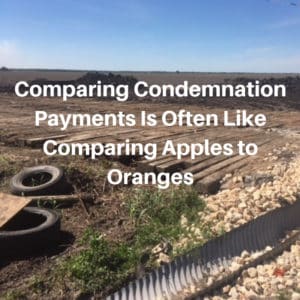Is Comparing Condemnation Payments a Good Idea?
Should you be comparing condemnation payments with your neighbors? Are easement agreements going to provide landowners with the same compensation per foot or per rod of the easement? The answer is “probably not” as explained by Attorney Philip Hundl in this video. If you’d like an appointment with Mr. Hundl, please call his office at 800-266-4870.
Summary of the Comparing Condemnation Payments Video
This question about comparing condemnation payments was asked during the Q&A period following Mr. Hundl’s presentation on Landowner Rights in Property Condemnation.
Mr. Hundl – – Yes sir.
– [Audience Member] Thank you, Mr. Hundl, for your presentation. I have a couple questions. One of them would be, you know certainly if someone is working on a condemnation easement, they might be running through your neighbor’s fields as well. And sometimes neighbors talk, and sometimes they might share some information. Sometimes they might keep certain parts private.
So what if you sign an easement agreement and then, you know, some period of time passes later, and you hear that your neighbor might have gotten, you know, restituted more properly than you were. Is there any way to fix that situation, or is it too late after that much time?
Mr. Hundl – So, I can answer with multiple answers, that are all going to be about right. So, the answer is probably no, you can’t fix it. Sure, we can talk about, you know, getting a most-favored nations clause in your easement agreement, you know. And you know, if you ask enough lawyers, or you’ve seen enough oil and gas leases, sure, sometimes oil and gas companies will give you that most-favored nations clause, right?
I don’t see it in pipeline cases. I mean, I don’t see, you know, that agreed to by pipeline companies. So, but I will also say that make sure that the comparison [of condemnation payments] is apples to apples, also.
What I mean by that, my client may have gotten, you know, X amount per rod, or per foot, you know. But then we also, we also got some economic, I’m going to call it economic damages for loss of use of the pasture. And, you know, because it was this, you know, this type of grass, we’re going to have to replant, it’s going to cost this much. So we got some other damages over here that maybe my landowner is saying well, we got, you know, X amount per rod, but they’re not, they’re not including this.
And the neighbor, that they’re lumping it all together, and saying we got this much a rod. Well, if we lumped all these damages together, and the per rod that they paid us, then maybe we’re about the same, maybe we’re higher, right? And I also know a lot of landowners and lawyers that may want to embellish what they didn’t get, and they really didn’t get that. That’s all.
So, I always kind of say, you absolutely have freedom of speech, and tell people whatever you want to, and you can share with them whatever you want to. But I normally just say it’s better just to keep it private. I mean, you know, it’s just like your finances. I don’t think you’d share your finances with anybody and everybody, so. So be careful with the neighbor that likes to say that they got more than everybody else. That’s all. Maybe it’s true, maybe it’s not true, so.
And also, I go back to, each track is specific and different, right? So, you know, well, maybe the landowner that said well I got this much, well they also are going to allow surface facilities, and allow a lot of other things above the easement agreement. And once again, maybe a lot more restrictive on the landowner.
There’s access roads. I mean, you can easily say that, and that’s a good example. I mean, of the, you know, landowner got this much per, per rod, really, really high. Oh, well yes, there’s two miles of access roads to the easement also. So that’s, that’s all, so.
– [Audience Member] So that’s another added point, is that just ’cause our neighbor got X thousand dollars, doesn’t mean that we’re, we might be a thousand more. That’s why we would come visit with you.
Mr. Hundl – Well, right, right, and that’s why I say, focus on the non-monetary terms first. Because then you know, okay, now we’ve agreed on, we’re all in agreement, hopefully, right? This is what the easement agreement’s going to look like. This is what it’s going to allow, so, so no roads whatsoever. And that’s, you know,
You may say, well, you know, that’s normally a done deal. I mean, I have had a case where there was going to be almost three miles of access road, and then all of a sudden, they decided, no, that’s okay. We found another way to get to the pipeline. So, you know, it’s a big difference monetarily. You know, the client was happy, because they didn’t want access roads.
And if you change clients, another client would have been really upset because they would have really wanted that additional compensation. And, of course, with use of existing roads, and it was existing roads, and there would be maintenance, and annual maintenance, and things like that.

So, if you can compare apples to apples, great, but almost, it’s never apples to apples, that’s all. So a very good question, very good question.
– [Audience Member] Thank you, sir.
Helping Landowners in South Texas
Mr. Hundl’s law firm has offices in Richmond and Fulshear in Fort Bend County and in Wharton and El Campo in Wharton County. Call 800-266-4870 for an appointment regarding your condemnation case.
Call 800-266-4870 or text 979-320-9320 for an appointment. We can also arrange for online and telephone appointments all over Texas.